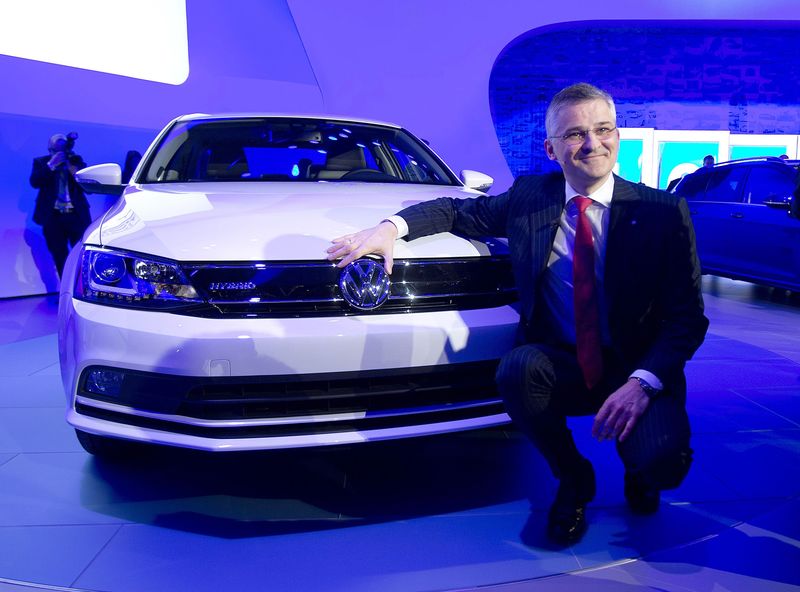By Ben Klayman and Andreas Cremer
DETROIT/BERLIN (Reuters) - Volkswagen AG (DE:VOWG_p) expects "limited growth" in the United States over the next two years and will focus on defending the market share it has, the top executive for the region told Reuters, suggesting the German automaker will fall short of an ambitious 2018 sales target.
VW's U.S. chief, Michael Horn, downplayed the importance of hitting annual U.S. sales of 800,000 vehicles by 2018, a goal VW Chief Executive Martin Winterkorn has held to despite slumping U.S. sales for the brand over the past two years.
The 2018 sales target "is still a relevant objective ... but, on the other hand, if you just focus on one year and one number you would do crazy things, so the most important thing is to have a long-term strategy," Horn said.
Horn's comments represent a new realism about the uphill climb VW faces in America, despite $1 billion invested for a new factory near Chattanooga, Tennessee. The brand's U.S. struggles were a key issue behind the clash this year between Winterkorn and former Chairman Ferdinand Piech that resulted in Piech's April resignation.
Now, Horn must sustain the brand in the world's richest auto market through a product drought, even as Detroit's General Motors Co (N:GM), Ford Motor Co (N:F) and Asian rivals such as Hyundai Motor Co (KS:005380) and Toyota Motor Corp (T:7203) are pumping out new models in hot segments, such as midsize sport utilities, where VW has little new to offer.
"There will be a phase until 2017 where we have limited growth ... and where we need to defend our position," Horn said in an interview this month at the company's U.S. headquarters in suburban Washington.
The VW brand's current U.S. lineup is heavy on compact cars and midsize sedans at a time when consumers favor sport utility vehicles of all sizes. The brand will get a new mid-sized SUV and a redesigned Tiguan crossover in 2017 and other new models, including eventually a $20,000 compact SUV, will follow at a faster pace than before, Horn said.
Volkswagen brand sales in the United States have been sliding since 2012, when they reached nearly 440,000 vehicles. U.S. sales fell to 367,000 vehicles last year and are down another 4 percent this year. The VW brand sold almost 570,000 vehicles in 1970, its U.S. peak year.
VW's U.S. market accounted for 5.8 percent of total year-to-date sales for the parent company, whose brands also include luxury division Audi and sports-car maker Porsche.
Industry consultant LMC Automotive forecasts new models will push the VW brand's U.S. sales back to 495,000 vehicles in 2018 - well short of the 800,000 figure Winterkorn has targeted.
The company does not break out U.S. profits by brand but a person familiar with the company said the brand has not turned a profit in the United States throughout Winterkorn's eight-year tenure. Winterkorn has pledged to commit more time to U.S. operations to tackle the trouble spots.
Dealers and former VW executives expect Horn, a VW veteran of almost 25 years, to have a stronger voice at headquarters. Horn's to-do list includes getting core VW models like the Jetta and Passat on track to be redesigned every five years, instead of riding for seven years between overhauls.
The company will shift its U.S. offerings toward trucks and SUVs, reflecting market demand. Besides new SUVs, Horn said VW is studying a large pickup for the U.S. market. That vehicle would not come before 2020, he said. The idea got support earlier this month by Bernd Osterloh, head of VW's works council.
Meanwhile, Horn is assembling a team of 200 engineers and product planners in Chattanooga. Those engineers could help tailor models to U.S. consumer tastes, more quickly adding technology like Bluetooth connectivity and USB ports as standard features.
Alan Brown, partner at a VW dealer that in February opened a $25 million facility in Frisco, Texas, said he and other dealers met with Winterkorn in Germany in March and are behind the U.S. plan.

"I think the future is going to tell us that Winterkorn and Horn got the job done," he said.